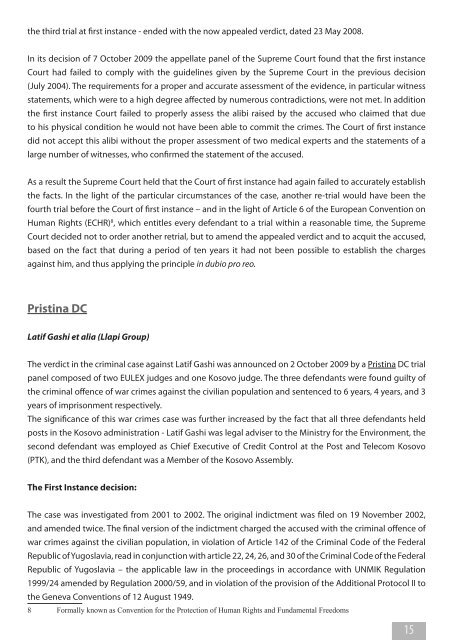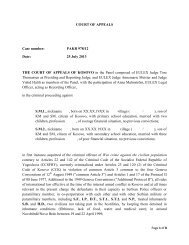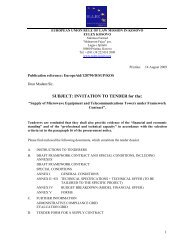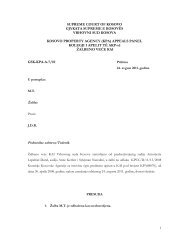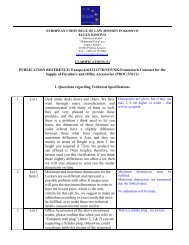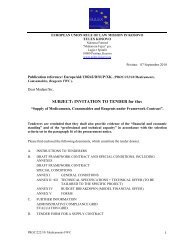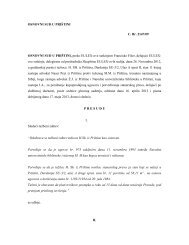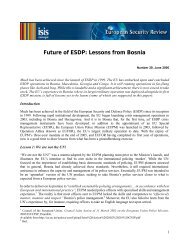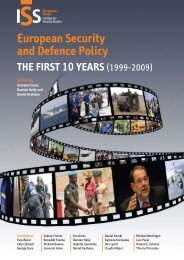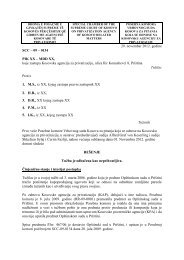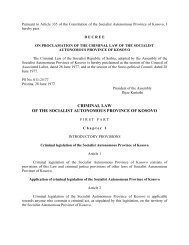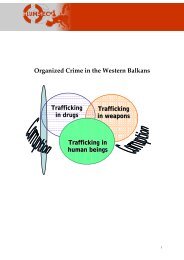English - Eulex
English - Eulex
English - Eulex
You also want an ePaper? Increase the reach of your titles
YUMPU automatically turns print PDFs into web optimized ePapers that Google loves.
the third trial at first instance - ended with the now appealed verdict, dated 23 May 2008.<br />
In its decision of 7 October 2009 the appellate panel of the Supreme Court found that the first instance<br />
Court had failed to comply with the guidelines given by the Supreme Court in the previous decision<br />
(July 2004). The requirements for a proper and accurate assessment of the evidence, in particular witness<br />
statements, which were to a high degree affected by numerous contradictions, were not met. In addition<br />
the first instance Court failed to properly assess the alibi raised by the accused who claimed that due<br />
to his physical condition he would not have been able to commit the crimes. The Court of first instance<br />
did not accept this alibi without the proper assessment of two medical experts and the statements of a<br />
large number of witnesses, who confirmed the statement of the accused.<br />
As a result the Supreme Court held that the Court of first instance had again failed to accurately establish<br />
the facts. In the light of the particular circumstances of the case, another re-trial would have been the<br />
fourth trial before the Court of first instance – and in the light of Article 6 of the European Convention on<br />
Human Rights (ECHR) 8 , which entitles every defendant to a trial within a reasonable time, the Supreme<br />
Court decided not to order another retrial, but to amend the appealed verdict and to acquit the accused,<br />
based on the fact that during a period of ten years it had not been possible to establish the charges<br />
against him, and thus applying the principle in dubio pro reo.<br />
Pristina DC<br />
Latif Gashi et alia (Llapi Group)<br />
The verdict in the criminal case against Latif Gashi was announced on 2 October 2009 by a Pristina DC trial<br />
panel composed of two EULEX judges and one Kosovo judge. The three defendants were found guilty of<br />
the criminal offence of war crimes against the civilian population and sentenced to 6 years, 4 years, and 3<br />
years of imprisonment respectively.<br />
The significance of this war crimes case was further increased by the fact that all three defendants held<br />
posts in the Kosovo administration - Latif Gashi was legal adviser to the Ministry for the Environment, the<br />
second defendant was employed as Chief Executive of Credit Control at the Post and Telecom Kosovo<br />
(PTK), and the third defendant was a Member of the Kosovo Assembly.<br />
The First Instance decision:<br />
The case was investigated from 2001 to 2002. The original indictment was filed on 19 November 2002,<br />
and amended twice. The final version of the indictment charged the accused with the criminal offence of<br />
war crimes against the civilian population, in violation of Article 142 of the Criminal Code of the Federal<br />
Republic of Yugoslavia, read in conjunction with article 22, 24, 26, and 30 of the Criminal Code of the Federal<br />
Republic of Yugoslavia – the applicable law in the proceedings in accordance with UNMIK Regulation<br />
1999/24 amended by Regulation 2000/59, and in violation of the provision of the Additional Protocol II to<br />
the Geneva Conventions of 12 August 1949.<br />
8 Formally known as Convention for the Protection of Human Rights and Fundamental Freedoms<br />
15


